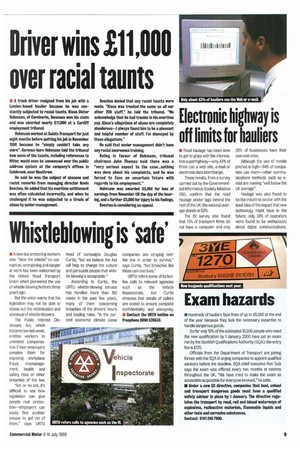Whistleblowing is 'safe'
Page 11

If you've noticed an error in this article please click here to report it so we can fix it.
• A new law protecting workers who "blow the whistle" on corruption, wrongdoing and danger at work has been welcomed by the United Road Transport Union which pioneered the use of whistle-blowing hotlines three years ago.
But the union warns that the legislation may not be able to stamp out the victimisation and dismissal of whistle-blowers.
The Public Interest Disclosure Act, which became law last week, entitles workers to unlimited compensation if their employers penalise them for exposing workplace fraud, mismanagement, health and safety risks or other breaches of the law.
"Act or no act, it's difficult to see how legislation can give people real protection—employers can easily find another excuse to get rid of them," says URTU head of campaigns Douglas Curtis, "but we believe the Act will help to change the culture and persuade people that whistle-blowing is acceptable."
According to Curtis, the URTU whistle-blowing service has handled more than 150 cases in the past few years, many of them concerning breaches of the drivers' hours and loading rules. In the current economic climate some
companies are straying over the line in order to survive," says Curtis, "but breaches like these can cost lives."
URTU refers some of its hotline calls to relevant agencies such as the Vehicle Inspectorate, but Curtis stresses that details of callers are coded to ensure complete confidentiality and anonymity.
• Contact the URTU hotline on freephone 0800 526639.








































































































